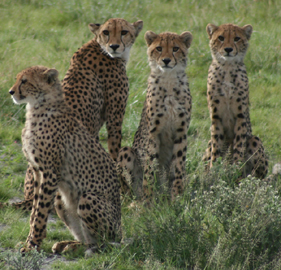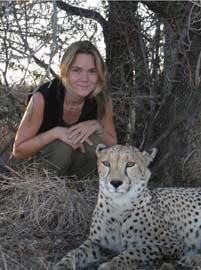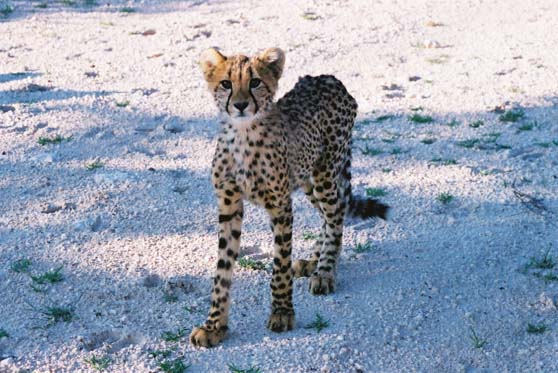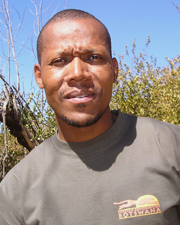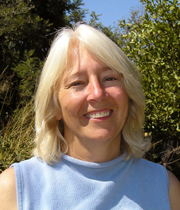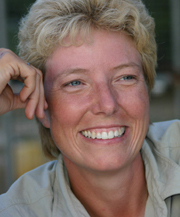| Cheetah Conservation Botswana | ||
|
|
CCB aims to preserve Botswana’s cheetah population through scientific research, community outreach and education. It works with rural communities to promote coexistence with Botswana’s rich diversity of predator species. | |
|
Rebecca Klein is the Project Manager for Cheetah Conservation Botswana. She has a BSc (Hons) Zoology from Leeds University, UK and is currently studying for a Masters with Professor Ric Bernard at Dept of Zoology & Entomology,Rhodes University, South Africa. She was previously working for conservation projects in UK, Malaysia and Thailand. Rebecca has been a member of the Cat Specialist Groupsince 2006. rebecca@cheetahbotswana.com submitted: 2703/2007 |
Rebecca
Klein |
|
|
One of Africa’s most endangered cats Cheetah populations are declining. The species is now threatened with extinction due to loss of habitat and prey, a diminishing gene pool and human persecution. Botswana contains one of the largest remaining populations of free ranging cheetahs in the world. In 2003, it was estimated at 1770 individuals. Identifying Botswana as one of the last strongholds of the species. However, populations are not safe within protected areas as they are out-competed by stronger predators. Cheetahs then move out onto marginal land where they come into conflict with rural communities. Neither protected reserves, nor captive management can be relied upon to support viable populations of the species. Long term survival is dependant on conservation management of agricultural zones. Conservation of the cheetah depends on the attitudes of Botswana’s farming communities. CCB aims to create an integrated plan to assist the survival of Botswana’s free ranging cheetah and the habitat on which the species depends, ensuring the spirit of the Kalahari remains for future generations.
|
||
|
Cheetah Conservation Botswana (CCB) is a long term, multi-disciplinary project incorporating practical conservation, scientific research and community education. In order to assess, monitor and maintain healthy cheetah populations nationally. CCB is developing a conservation program focusing on reducing cheetah / livestock conflict and improving the attitudes of the farming community and their methods of predator control. CCB carries out research into cheetah behaviour, home ranges, density, disease and genetics. Cheetahs are collared using GPS collars for telemetry studies. Spoor tracking using transects is used to assess cheetah density. Samples are taken from captured cheetahs to gather information on disease and genetics status. Rehabilitation and relocation are techniques carefully utilised and monitored for success. Surveys are conducted on predator conflict in the farmlands of Botswana, looking at predator distributions, conflict on farmlands, current methods of farm management and community perceptions. |
|
Young cheetah cub belonging to collared female, part of the home range study at Jwana Game Park. (Photo D. Yearley) |
|
|
|
Our community outreach program exists to inform rural communities about the importance of cheetahs and predators. This includes visits to affected communities to assess their problems and offer solutions; provision of information on appropriate farm management and non lethal methods of predator control, through materials distributed and regular rural workshops.
Awareness raising about predators is essential in the region. Currently, perceptions of predators are very negative but communities are interested in improving the current status quo (Photo R. Klein). |
|
Our education program includes presentations and activities in schools throughout Southern Botswana; provision of educational materials to schools to learn about predators; presentations at Mokolodi Nature Reserve’s education centre which sees over 12,000 young people every year; teacher training workshops; and training of local volunteers in all aspects of the project. Awareness is raised through stalls and presentations at farmers’ days and meetings, agricultural shows and radio-shows; a DVD has been produced to promote the use of effective livestock management; regular articles are placed in magazines, newspapers and relevant productions; a theatre show is now being developed with traditional dance and performance group, Lobone Creations, on the plight of the cheetah.
|
|
|
Data collected is collated and made available to the Department of Wildlife and National Parks for integration into the national predator management strategy. It is taken back to the rural communities for integration into their farm management. It is also provided to the global cheetah conservation community in order to add the Botswana perspective to the overall effort to preserve this unique species. Ultimately, the aim is to result in a decrease in conflict and an increased tolerance for predators, benefiting both rural communities and the cheetah’s survival long term. |
|
|
CCB has been running for 4 years and is making good progress on raising the profile of the cheetah and enhancing the understanding of Botswana’s cheetah. The information collected, provides a deeper understanding of cheetahs status, distribution, ecological needs and an insight into the situation of predator conflict in farming areas. The current methods of farm management utilized, what problems communities are experiencing and overall perceptions. With this information it becomes clearer where real problems lie and what improvements need to be made on order to facilitate coexistence and long term survival of cheetah populations. |
||
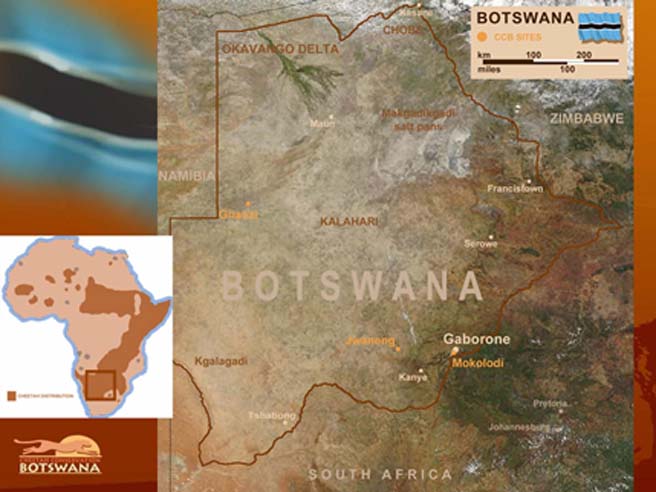 |
|
Our first research camp, situated at the 20,000ha Jwana Game Park in the Southern Kalahari was completed in Sept 2003. Here cheetah home ranges, behaviour and density are studied through regular spoor surveys and telemetry. A community survey is being carried out in the areas surrounding the reserve. It is planned to have these studies ready for distribution by the end of 2007.
A new research camp was set up in Sept 2005 in the Ghanzi farmlands of Western Botswana, an area with high levels of cheetah / livestock conflict. Initially, a farm survey is being carried out to assess levels of conflict, with further plans to carry out spoor surveys and monitor collared cats on farmlands.
Botswana is a semi arid country in Southern Africa. CCB operates nationwide, although focused outside protected areas in Southern and Western Botswana, where cheetah densities are highest (Map B. Jones). |
|
The community outreach and education program is progressing well. Mobile workshops are held monthly and visit affected communities presenting the theme ‘Sharing the Land with Predators’. Training workshops have been done for Wildlife Officers at the request of the Department of Wildlife and National Parks and material is now being used in the training information for Problem Animal Control Officers. Educational talks for classes are a regular event and learning materials have been created and provided to schools. Teacher training workshops are held in collaboration with Cheetah Outreach, educating the educators to take predator conservation education further through Botswana. The new DVD ‘Spirit of the Kalahari’ is complete and tells the tale of 2 farmers utilising different methods and their experiences. It is done by local performers in the local language Setswana. This will join our learning materials and is set to evolve into a travelling theatre show. |
||
|
NEXT STEPS 1. Ongoing research into cheetah home ranges, population density, disease and genetics; in Tuli and Ghanzi farmlands. 2. Completion of Botswana cheetah census. 3. Ongoing community outreach promoting the importance of predators in and methods to minimize livestock loss. 4. Ongoing school and clubs education program, with an increase in number of teacher training workshops. 5. Collaboration with government ministries to promote this information nationwide. 6. Local research projects into farm management and effects of different techniques on livestock losses. 7. Set up of demonstration farm. Investigation into alternative livelihoods such as beekeeping, craft production, ecotourism and potential ‘predator friendly’ income generating ideas such as predator friendly beef. Ultimately, perceptions of these communities have the real potential to improve when they have the ability to derive an income from coexisting with predators. |
|
|
|
Project Team |
|
|
|
|
|
|
|
|
|
Wabothle Letubo graduated from University of Botswana with an Environmental Science degree. She joined CCB in 2006 as the education coordinator and keeps very busy travelling the country teaching in schools and holding regular teacher training workshops. |
Thabang Segaetsho graduated from the University of Cape Town with a Biological Sciences degree. He joined CCB in 2006 as the community outreach coordinator. He works tirelessly with communities to improve livestock management techniques, land utilisation and raise awareness about predators. |
Dr. Kyle Good is a veterinarian trained at Virginia/ Maryland College of Veterinary Medicine. She has been with CCB since it's inception as Director of Veterinary Medicine and Organisational Development. She has a background in wildlife rehabilitation and previously conducted research on black rhino in Zimbabwe. |
Ann Marie Houser has a BSc Wildlife Biology/African wildlife Management from Michigan State University, USA. She is currently working on a Masters through Michael Somers at Center of Wildlife Manage- ment,University of Pretoria, South Africa. Previous experience includes work in Wildlife Management, Kenya, and Asian Elephant Ecology and Management, India. |
|
|
|
|
Project Information |
|
|
Duration: |
2003-ongoing |
|
Location (see map): | Southern Botswana |
|
Sponsor(s): | Wildlife Conservation Network, Debswana, Global Environment Facility, Howard Buffet Foundation, American Zoological Association, Banham Zoo |
|
Project address: | Cheetah Conservation Botswana, Mokolodi Nature Reserve, Private Bag 0457, Gaborone, Botswana |
|
Project leader: |
Rebecca Klein, Managing Director: rebecca@cheetahbotswana.com Sedia Modise, Chairman of the Board: peaceparks@botsnet.bw Dr Kyle Good, Organisational Development and Director
of Veterinary Medicine: Ann Marie Houser, Director of Field and Research and Volunteer Coordinator: ahouser@debswana.bw |
|
Website | www.cheetahbotswana.com |
Download as PDF
